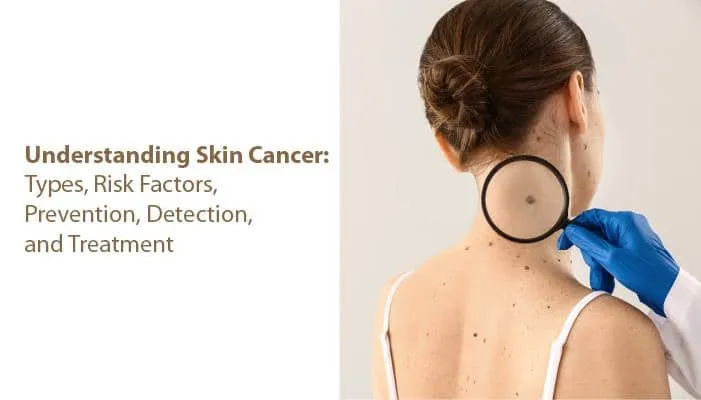Understanding Skin Cancer: Types, Risk Factors, Prevention, Detection, and Treatment
October 4, 2023
Introduction:
The skin cancer as a serious health concern and one of the most common forms of cancer.
This blog will provide information on different types of skin cancer, risk factors, prevention strategies, early detection methods, and available treatments.
Types of Skin Cancer:
- Basal Cell Carcinoma (BCC): The BCC as the most common type, often appearing as a pearly bump or red patch.
- Squamous Cell Carcinoma (SCC): The SCC as a cancer that usually appears as a firm, red nodule or a flat, scaly lesion.
- Melanoma: Melanoma as the most aggressive form of skin cancer, typically developing from unusual moles or existing skin.
Risk Factors for Skin Cancer:
- UV Exposure: The excessive exposure to ultraviolet (UV) radiation from the sun or tanning beds is a significant risk factor.
- Fair Skin: The people with fair skin are more susceptible to skin cancer due to less melanin protection.
- Family History: Its a importante factor the genetic predisposition and family history are plays a vital role.
- Moles and Skin Conditions: The certain moles or pre-existing skin conditions can increase the risk.
Prevention of Skin Cancer:
- Sun Protection: The use of sunscreen, protective clothing, hats, and sunglasses to shield the skin from UV rays.
- Avoid Tanning Beds: The dangers of indoor tanning and the increased risk of skin cancer.
- Regular Self-Exams: Its recommended to perform regular skin self-exams to spot any unusual changes.
- Seek Shade: Its suggested to seeking shade during peak sun hours (10 a.m. to 4 p.m.) when UV rays are strongest.
Early Detection and Self-Exams:
- To conduct skin self-examinations to identify suspicious moles or lesions you can use mirro to find "ugly duckling" moles don't look like the others. Moles that are of a different shape, color, texture or size may indicate a cancerous growth.
- The ABCDE rule (Asymmetry, Border, Color, Diameter, Evolving) for evaluating moles and spots.
- Its important to seek prompt medical attention if any concerning changes are detected.
Treatment Options for Skin Cancer:
- Surgical Removal: The surgical excision as a common method to remove cancerous lesions.
- Mohs Surgery: Mohs surgery as a specialized technique for removing skin cancer layer by layer. The process keeps going until there are no signs of cancer.
- Radiation Therapy: The use of radiation to target cancer cells also helpfull, beams of intense energy help to burn canser cell.
- Chemotherapy and Immunotherapy: In chemotherapy medical person use drug treatment that containts powerful chemicals to kill cancer cells and in immunotherapy they substances made by the body or in a laboratory to boost the immune system.
Conclusion:
- The key takeaways, its important of sun protection, regular self-exams, and early detection.
- Consult a dermatologist for skin checks and any concerns about skin changes.
Is skin cancer preventable?
While skin cancer may not always be preventable, reducing UV exposure through sun protection measures can significantly lower the risk.
Can anyone get skin cancer, regardless of skin type or age?
Yes, anyone can develop skin cancer, but those with fair skin, a history of sunburns, and a family history of skin cancer are at higher risk.
NOTICE BOARD
CONTACT US
CONTACT US
 Book Appointment
Book Appointment


.svg)
.svg)
.svg)
.svg)








